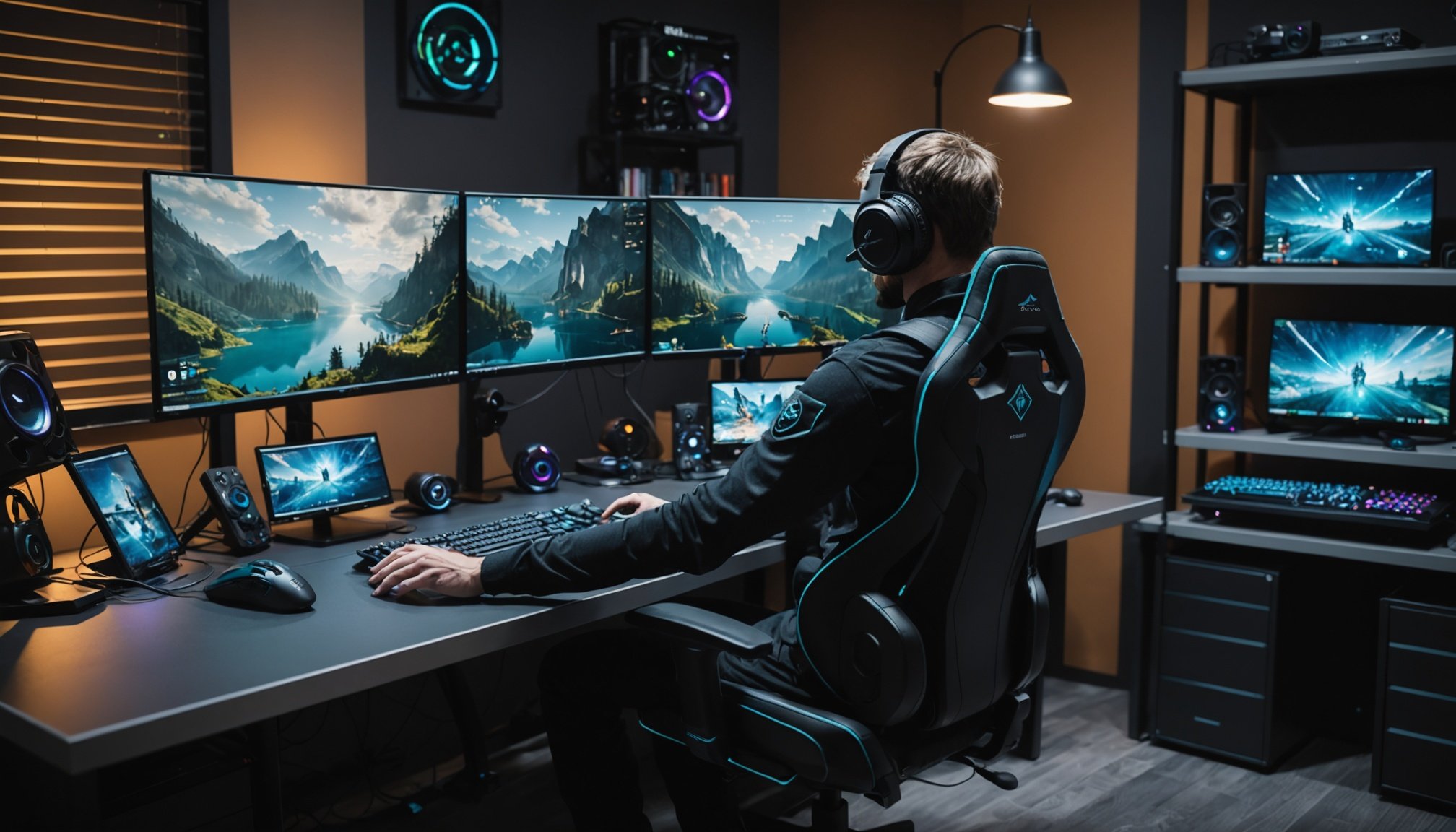Crafting the Perfect Harmony: Achieving a Balanced Setup for Gaming and Productivity
In today’s fast-paced world, where the lines between work and personal life are increasingly blurred, creating a balanced setup that caters to both gaming and productivity is more crucial than ever. Whether you’re a professional gamer, a remote worker, or simply someone who loves to game in their free time, achieving this balance is key to maintaining a healthy work-life harmony.
Understanding Your Needs
Before diving into the specifics of setting up your ideal workspace, it’s essential to understand your needs and priorities. Here are a few questions to consider:
Also read : Mastering temperature control: expert tips for efficiently monitoring your system
- What are your primary uses for the computer? Are you primarily gaming, or do you also need it for work or other productivity tasks?
- What is your budget? Different components and setups can vary significantly in price.
- How much space do you have available? This will help you decide on the size and layout of your desk and components.
Assessing Your Desk Space
When planning your setup, the first step is to assess your desk space. Here’s a table summarizing common dimensions for desk space suitable for a dual PC setup or a combined gaming and productivity setup:
| Desk Type | Length (inches) | Depth (inches) | Height (inches) | Description |
|---|---|---|---|---|
| Standard Desk | 60-72 | 24-30 | 28-30 | Suitable for placing two monitors side by side, with space for keyboards, mice, and other accessories. |
| L-Shaped Desk | 60-72 per side | 24-30 | 28-30 | Offers additional surface area with two distinct sections, ideal for separating workspaces or peripherals. |
| U-Shaped Desk | 60-72 per side | 24-30 | 28-30 | Provides extensive surface area, great for multiple monitors and additional equipment. |
| Corner Desk | 48-60 | 24-30 | 28-30 | Utilizes corner space efficiently, often fits two monitors with a bit more limited space. |
| Sit-Stand Desk | 48-72 | 24-30 | Adjustable (28-48) | Adjustable height for sitting and standing positions, suitable for ergonomic flexibility. |
Choosing the Right Hardware
For Gaming
When it comes to gaming, the hardware you choose can make a significant difference in your performance and overall experience.
Also to discover : Unlocking optimal pc performance: a guide to mastering monitoring software
Budget-Friendly Option
For a budget-friendly gaming setup, consider the following components:
| Component Type | Model | Price (at Pub Time in USD) |
|---|---|---|
| CPU | Intel Core i3-14100F | $90 |
| Motherboard | Gigabyte B760M DS3H DDR4 | $119 |
| GPU | Intel Arc A380 | $119 |
| RAM | Silicon Power Value Gaming DDR4 RAM 16GB (8GBx2) 3200MHz | $25 |
| Storage | Crucial P3 Plus (1TB) | $64 |
| Case | Cooler Master MasterBox Q300L | $42 |
| PSU | Thermaltake Smart Series 500W | $39 |
| Cooler | N/A, comes with CPU |
This setup, costing around $498, allows you to play games at 1080p with modest settings, a significant improvement over integrated graphics[1].
Mid-Range Option
For a mid-range setup that can handle more demanding games, consider the following:
| Component Type | Model | Price (at Pub Time in USD) |
|---|---|---|
| CPU | AMD Ryzen 7 5700X3D | $224 |
| Motherboard | Gigabyte B550M K | $99 |
| GPU | Nvidia RTX 4060 Ti | $399 |
| RAM | Crucial RAM 32GB Kit (2x16GB) DDR4 3200 | $57 |
| Storage | WD Blue SN580 (2TB) | $114 |
| Case | Phanteks XT Pro | $49 |
| PSU | Corsair CX750M | $89 |
| Cooler | ID-Cooling FrostFlow 280mm | $53 |
This setup, costing around $1,084, can handle games at 1080p and 1440p with strong frame rates[1].
For Productivity
For productivity, you may not need the most powerful gaming hardware, but you still want components that can handle demanding tasks efficiently.
Key Components
- CPU: A mid-range to high-end CPU like the AMD Ryzen 7 5700X3D or Intel Core i5-14600KF is ideal for both gaming and productivity.
- RAM: 32GB of DDR4 or DDR5 RAM is sufficient for most productivity tasks and gaming.
- Storage: A fast SSD like the WD Black SN850X (2TB) ensures quick loading times and efficient data access.
- Monitor: Choose a monitor with good resolution and adjustable height for ergonomic comfort.
Setting Up Your Workspace
Ergonomic Considerations
Creating an ergonomic workspace is crucial for maintaining comfort and reducing the risk of injury.
- Monitor Placement: Ensure your monitors are at the correct height and distance to avoid straining your neck and eyes.
- Keyboard and Mouse: Use a keyboard tray and mouse pad to keep your hands in a neutral position.
- Seating: Invest in a good ergonomic chair that supports your back and promotes good posture.
Multi-Computer Setup
If you need to use multiple computers simultaneously, here are some tips:
- Desk Space: Ensure your desk is large enough to accommodate both setups comfortably.
- Cable Management: Use cable organizers to keep your workspace tidy and reduce clutter.
- Monitor Stands: Use adjustable monitor stands to save desk space and position your monitors correctly.
Achieving Balance and Harmony
Time Management
Achieving a balance between gaming and productivity often comes down to effective time management.
- Set Working Hours: Define clear working hours and stick to them to avoid the temptation of gaming during work time.
- Breaks: Take regular breaks to recharge and avoid burnout.
- Scheduling: Schedule your gaming sessions around your work and other responsibilities.
Self-Care
Taking care of your mental and physical health is essential for maintaining a healthy work-life balance.
- Exercise: Regular physical activity can help reduce stress and improve focus.
- Mental Health: Take time to relax and engage in activities that help you unwind, such as reading or meditation.
- Feedback: Seek feedback from your team or family on how you can improve your balance between work and personal life.
Practical Insights and Actionable Advice
Creating a Flow State
Achieving a flow state, where you are fully immersed in your work or game, is key to productivity and enjoyment.
- Minimize Distractions: Ensure your workspace is free from distractions, such as turning off notifications or finding a quiet spot.
- Set Clear Goals: Define clear goals for what you want to achieve in your work or gaming session.
- Continuous Feedback: Regularly assess your performance and adjust your approach as needed.
Building a Supportive Team
Whether you’re part of a professional team or a gaming community, having a supportive team can make a significant difference.
- Communication: Maintain open and clear communication with your team to ensure everyone is on the same page.
- Feedback Loop: Encourage a feedback loop where team members can provide constructive feedback to improve performance.
- Team Building: Engage in team-building activities to foster a sense of camaraderie and support.
Crafting the perfect harmony between gaming and productivity is a personal journey that requires careful planning, effective time management, and a commitment to self-care. By choosing the right hardware, setting up an ergonomic workspace, and achieving a balance between your work and personal life, you can create a setup that supports both your professional and personal needs.
As one gamer and remote worker noted, “Finding the right balance between gaming and work isn’t just about managing your time; it’s about creating a flow state where you can fully immerse yourself in whatever you’re doing. With the right setup and mindset, you can achieve harmony and excel in both aspects of your life.”
By following these tips and insights, you can create a setup that not only enhances your gaming performance but also supports your productivity and overall well-being, leading to a healthier work-life balance and a more fulfilling life.











